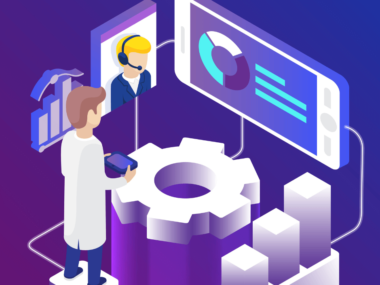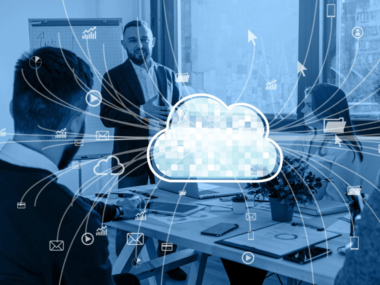Artificial intelligence (AI) is transforming the way businesses operate. The way we think about business is being revolutionized. Businesses can now make better decisions and operate more efficiently.
AI is now a reality, not just a futuristic concept. It is transforming the business world.
AI can process large amounts of data. It does this quickly and accurately, which is a significant advantage. Businesses can make better decisions based on data-driven insights. They no longer have to rely on intuition or guesswork.
AI can analyze data from multiple sources. It provides insights that humans cannot uncover alone. This is particularly useful for businesses that operate in complex markets or industries.
Another advantage of AI is its ability to automate repetitive tasks. This frees employees to focus on more value-added tasks, such as strategic planning and customer service.
AI can enhance the precision and speed of data entry and analysis tasks. Businesses can save time and money with this improvement.
AI is revolutionizing business operations. Companies that don’t embrace it risk falling behind their competitors.
What Is Artificial Intelligence? Exploring the World of AI
Artificial intelligence (AI) is a rapidly advancing field of technology that aims to simulate human intelligence in machines. From self-driving cars to virtual assistants like Siri and Alexa, AI apps are becoming an integral part of our daily lives. But exactly what is AI, and how does it work?
In this section, we’ll break down artificial intelligence: what is it, how it’s transforming industries, and why it’s the future of innovation.
What Is Artificial Intelligence?
Artificial intelligence is the creation of systems and machines. They can perform tasks that usually require human intelligence. These tasks include learning, reasoning, problem-solving, understanding natural language, and recognizing patterns.
When people ask, “What is a AI?” or “What is artificial intelligence?”, the answer lies in the combination of data, algorithms, and computational power. AI systems analyze vast data to learn. They make decisions and predictions, mimicking human thought.
Types of Artificial Intelligence
AI can be divided into two main categories:
General AI: These are machines. They can understand and do any task a human can. While this remains theoretical, researchers continue to explore its possibilities.
A subset of AI is machine learning, where systems learn and improve from experience without explicit programming. Another advanced form is deep learning, which uses neural networks inspired by the human brain.
What Is an AI System?
When you ask, “What is an AI?”, it typically refers to a combination of hardware and software that enables machines to mimic human intelligence. For example, an AI app like Grammarly uses natural language processing to correct grammar and suggest better sentence structures.
AI systems function by:
Data Collection: Gathering large datasets for training.
Processing: Using algorithms to identify patterns or relationships.
Action: Making predictions or decisions based on the processed data.
Applications of Artificial Intelligence
AI is reshaping industries in ways once considered science fiction:
Healthcare: AI assists in diagnosing diseases, developing treatments, and managing patient data efficiently.
Finance: Banks use AI for fraud detection, credit scoring, and automating customer service.
E-commerce: Personalized recommendations and chatbots enhance user experience.
Transportation: Self-driving cars rely on AI for navigation and decision-making.
The question “What is AI?” can best be answered by examining its real-world impact, from optimizing supply chains to improving education through adaptive learning systems.
Benefits of Artificial Intelligence
Efficiency: AI automates repetitive tasks, freeing up human resources for strategic activities.
Accuracy: By analyzing vast datasets, AI reduces errors in fields like healthcare and finance.
Personalization: AI apps tailor user experiences, whether in shopping, entertainment, or education.
Challenges of AI
While artificial-intelligence offers immense benefits, it comes with challenges:
Ethics: Questions about privacy, bias, and job displacement remain unresolved.
Costs: Developing and implementing AI systems can be expensive.
Reliability: AI systems must be carefully monitored to prevent errors or misuse.
How to Get Started With AI Tools
If you’re curious about exploring AI for your personal or business needs, there are many tools available to help you get started. For example, AI apps can streamline workflows or enhance customer engagement. To find affordable tools, explore AI Solutions on AppSumo.
Domain and Hosting for AI Projects
Thinking of launching your own AI app or project? Secure your domain and hosting today:
Reference Sources
What Is Artificial Intelligence? – IBM AI
Applications of AI – Forbes AI Insights
Ethics in Artificial Intelligence – World Economic Forum
Understanding Artificial Intelligence
AI is a branch of computer science. It creates intelligent machines. These machines perform tasks that require human intelligence.
AI systems are designed to learn from data, identify patterns, and make decisions based on that data.
AI systems can be broadly categorized into two types:
Narrow or weak
AI: Narrow or weak AI systems perform specific tasks like speech recognition or image classification. These systems are not capable of performing tasks outside of their particular domain.
General or Strong AI: These are systems designed to perform any intellectual task a human can do. These systems are still in science fiction and have not been realized yet.
AI systems are powered by algorithms that are designed to learn from data. These algorithms can be supervised, unsupervised, or semi-supervised.
Supervised learning trains the algorithm with labeled data. Unsupervised learning trains the algorithm with unequal data.
Semi-supervised learning is a combination of both supervised and unsupervised learning.
AI systems are utilized in the healthcare, finance, and retail industries. AI systems are used in healthcare to diagnose diseases. AI systems are used in finance to detect fraud.
In retail, AI systems are being used to personalize the shopping experience for customers.
AI is revolutionizing business. It automates tasks, boosts efficiency, and makes data-driven decisions.
AI technology is advancing. We will see more AI systems in different industries.
The Impact of AI on Business Operations
Artificial intelligence is changing how businesses operate. It improves efficiency, boosts productivity, and reduces costs. In this section, we will explore how AI is transforming business operations.
Improving Efficiency
AI-powered automation is improving business operations. It reduces manual labor and eliminates repetitive tasks.
Automating routine tasks gives employees more time. They can focus on higher-value tasks that need human intervention.
For instance, businesses use chatbots to provide customer service support. Chatbots handle simple customer queries, freeing up reps for complex ones.
Boosting Productivity
AI is helping businesses increase productivity. It provides insights not easily found traditionally.
AI can analyze large datasets to identify patterns and trends. This can help businesses make informed decisions.
AI-powered predictive analytics can assist businesses in forecasting future demand. This helps optimize their supply chain and prevent stockouts.
Reducing Costs
AI helps businesses cut costs by automating routine tasks. It also enhances efficiency and decreases the chance of errors.
AI-powered chatbots can handle customer queries. This reduces the need for human customer service representatives.
AI-powered predictive maintenance can help businesses identify potential equipment failures. It enables them to take corrective action before costly downtime occurs. Additionally, this technology can prevent equipment failures from happening.
AI is revolutionizing business operations. It improves efficiency, boosts productivity, and reduces costs.
AI will continue to evolve and have transformative impacts on businesses. We can expect to see these impacts in the years to come.
AI in Decision Making
Artificial intelligence has revolutionized the way businesses make decisions. With AI, we can analyze vast amounts of data and make previously impossible predictions. Here are two ways AI is changing decision-making in business:
Data Analysis
AI-powered tools can analyze large datasets and extract insights that humans might miss. This can help us make better decisions based on data-driven insights. For example, AI can analyze customer data to identify patterns and trends.
Understanding customer behavior and preferences can inform our marketing strategies. It can also tell our product development strategies.
Predictive Analytics
AI can also help us make predictions. We can use AI to predict future trends and outcomes by analyzing historical data. This can assist us in improving decisions about inventory management. It can also help with financial planning.
We can use predictive analytics to forecast product demand. This helps optimize the supply chain and reduce waste.
AI is revolutionizing decision-making in business. It allows us to analyze data more effectively. We can now make once-impossible predictions.
We can make more informed decisions that drive business success by leveraging AI.
AI in Customer Service
Customer service is all about supporting customers for a positive experience.
AI is changing how businesses handle customer service, making it better. It is more efficient, personalized, and effective. Here are some ways AI is changing the game:
Chatbots
Chatbots are virtual assistants powered by AI. They can answer customer questions, make product recommendations, and process orders.
They are available 24/7, which means customers can get the help they need when they need it without having to wait for a human representative.
Chatbots handle simple tasks quickly and accurately. They free up human representatives to focus on complex issues.
Chatbots can learn from previous customer interactions. This helps them provide accurate and helpful responses over time.
Robots can recognize customer sentiment and adjust responses to be empathetic. This creates a more human-like experience.
Personalized Experiences
AI can also help businesses provide personalized experiences to their customers. AI can analyze customer data to identify patterns and preferences. This allows companies to tailor their offerings to individual customers.
This can lead to higher customer satisfaction, increased loyalty, and more sales.
AI can analyze a customer’s purchase history. It can also analyze their browsing behavior. AI can suggest products that the customer may be interested in.
It can personalize marketing messages and promotions. It is based on customer interests and preferences.
Businesses can create a deeper connection with customers by providing personalized experiences. This leads to long-term loyalty and advocacy.
AI is revolutionizing customer service. It provides efficient and personalized experiences to customers.
AI is transforming the way businesses interact with customers through chatbots. Personalized experiences are another example of this transformation.
AI technology is evolving. We will see more innovative solutions emerge. These solutions will create a seamless and satisfying customer experience.
AI in Marketing
Artificial intelligence has revolutionized the way businesses approach marketing. AI enables us to analyze consumer behavior and preferences. We can use this data to create highly effective targeted advertising campaigns.
Targeted Advertising
One of the most significant benefits of AI in marketing is the ability to create targeted advertising campaigns.
We can analyze customer behavior, preferences, and demographics. This helps us create ads that resonate with our target audience.
This means we can spend less on advertising while still achieving better results.
AI can also help us optimize our advertising campaigns in real time. By analyzing data on ad performance, we can adjust our campaigns to improve their effectiveness.
For example, we can adjust the targeting of our ads or change the ad copy to make it more appealing to our target audience.
Consumer Behavior Analysis
AI can also help us analyze consumer behavior to understand their preferences and purchasing habits.
Analyzing data on customer interactions helps us understand their wants and needs. We gather this data from our website, social media, and other digital channels.
This data can be used to create personalized marketing campaigns tailored to our customers’ individual needs.
We can improve customer engagement by providing personalized content. Sales can also increase with the help of recommendations.
In conclusion, AI has transformed the way we approach marketing. Using AI, we can create targeted advertising campaigns and analyze consumer behavior. This helps achieve better results and improve customer engagement.
Challenges of Implementing AI in Business
AI has the potential to revolutionize business but presents challenges. These challenges must be addressed before implementation. Here are two of the most significant challenges of implementing AI in business.
Data Security
. AI systems need a lot of data to work well. This data can include sensitive information like personal and financial data and trade secrets.
Businesses must ensure AI systems are secure. They must protect the collected data from unauthorized access.
Businesses must implement robust security measures to address this challenge. These measures include encryption, access controls, and firewalls. They are necessary to protect their data. They must also ensure their AI systems comply with relevant data protection laws and regulations.
Cost of Implementation
Another significant challenge of implementing AI in business is the cost. Developing and implementing AI systems can be expensive, and many businesses may not have the resources to invest in such systems.
Additionally, businesses must factor in the cost of training employees to use the AI systems effectively.
Businesses can overcome this challenge by outsourcing AI system development and implementation. They can consider hiring third-party vendors for this task.
Reducing implementation costs helps businesses benefit from AI advantages in operations.
Implementing AI in business can be challenging. Addressing these challenges can revolutionize businesses’ operations and unlock AI’s potential.
Businesses can gain a competitive advantage by ensuring data security. They can also address the cost of implementation to take advantage of AI benefits.
The Future of AI in Business
As AI technology advances, we expect to see more businesses incorporating it into their operations.
According to Forbes, businesses use artificial intelligence (AI) in various ways. They use it to improve efficiencies, save time, and decrease costs.”
[1] One of the most exciting possibilities for AI in business is its potential to automate time-consuming, manual tasks.
According to a HubSpot blog post, AI can save your business money. 28% of business leaders have already experienced cost savings from AI.”
[2] For example, AI can automate customer service interactions, freeing employees to focus on more complex tasks.
Another area where AI is expected to have a significant impact is in the field of data analysis. Technology has the power to help us tackle substantial challenges. This was stated in a blog post from Harvard Professional Development.”
AI can analyze large amounts of data in real time. It helps businesses make informed decisions and find growth opportunities.
Of course, as with any new technology, there are concerns about the potential impact of AI on jobs.
As stated in a BCG article, AI will be everywhere. It will revolutionize transportation, manufacturing, health care, and retail.”
[4] While AI may replace some jobs, new jobs will be created as businesses adapt to this new technology.
Overall, the future of AI in business looks bright. AI technology is advancing. Businesses will incorporate it for efficiency, cost savings, and growth.

References:
- How Businesses Are Using Artificial Intelligence In 2023
- How AI Will Revolutionize the Future of Business, According to HubSpot
- What’s the Future of AI in Business? Professional Development…
- How Artificial Intelligence Will Transform Businesses | BCG
Frequently Asked Questions
What are some examples of how artificial intelligence is transforming businesses?
Artificial intelligence (AI) is transforming businesses in various ways. One example is the use of chatbots for customer service.
AI-powered chatbots can offer customer support around the clock. They can answer common questions and even handle difficult inquiries.
One example is using predictive analytics to forecast demand. Another example is optimizing pricing and reducing waste in supply chains.
AI is used to automate repetitive tasks such as data entry. This frees up employees to focus on more strategic work.
What technologies are revolutionizing business in artificial intelligence?
AI includes machine learning, natural language processing, and computer vision.
Machine learning algorithms allow computers to learn from data. They can then make predictions or decisions based on what they have learned.
Computers can understand and interpret human language through natural language processing. This ability enables the use of chatbots and virtual assistants.
Machines can interpret and analyze visual data using computer vision. This includes images and videos.
What are the benefits of implementing artificial intelligence in business, according to research?
Research has shown that implementing AI in business can lead to various benefits. For example, a study by McKinsey found that AI can increase productivity by up to 40%.
AI can enhance decision-making through data analysis, offering insights and recommendations. In addition, AI can enhance customer experiences by providing personalized recommendations and support.
How is the impact of artificial intelligence on business being studied?
Researchers and organizations worldwide are studying the impact of AI on business.
Researchers are studying AI to uncover its benefits and risks. They also examine the ethical implications of using AI.
Some organizations are studying how AI affects employment and the workforce. They are also exploring AI’s impact on economic growth and competitiveness.
What are some articles discussing the use of AI in business?
There are numerous articles discussing the use of AI in business. Forbes published an article. The article is about the artificial intelligence revolution. The article explains why it matters to your business.” [1].
Harvard Business Review has also published an article on “8 Questions About Using AI Responsibly, Answered” [2].
What changes can we expect in the future of business with the rise of AI?
With the rise of AI, we can expect to see significant changes in the way businesses operate. AI will enable businesses to automate repetitive tasks, optimize operations, and improve decision-making.
AI will help businesses offer personalized experiences, increasing customer loyalty and retention.
The rise of AI raises concerns about job displacement. It also raises concerns about the ethical implications of its use.
Conclusion
As technology evolves, advances in computing, AI, and data analysis are reshaping our lives and work. The potential for innovation is limitless. We can learn the history of computers. We can also use modern tools like AI apps and powerful web servers.
These technologies solve complex problems and boost efficiency. They do this in industries like healthcare, finance, and education.
Computing’s impact is undeniable. It is built on precise calculations and robust systems. It uses advanced server racks and CPUs. Whether you’re exploring AI or managing a web server, the right tools are critical for success.
Both businesses and individuals need reliable infrastructure. They also need innovative solutions. These will help them stay ahead in a fast-changing world.
If you want to start a new project, you must know the basics. This includes fixing a slow laptop, setting up hosting, and using AI tools. Access to affordable and efficient resources is key to scaling any tech initiative.
Explore these valuable tools to get started with your next tech venture:
- Performance-Enhancing Software Deals
- Reliable Hosting Plans for Web Projects
- Secure Domains for Your Business
Computing has come a long way. It started with the first computers and now includes cutting-edge AI. The journey is extraordinary, and it shows no signs of slowing down. With the right tools and knowledge, anyone can use modern technology for growth.
Reference Sources
- The Evolution of Computing – Computer History Museum
- Artificial Intelligence Applications – IBM AI Research
- Setting Up Web Servers – Microsoft Documentation








48 comments
MAFA \ Web’in kurumsal web tasarım hizmetleri, Türkiye genelindeki işletmelerin dijital varlıklarını güçlendirmek için yaratıcı ve özgün çözümler sunuyor. | kurumsal web tasarım hasankeyf
The author’s deep interest and knowledge were truly impressive. The inclusion of examples and case studies made the topic even more enlightening. | Narlıdere toptan giyim
نحوه طلاق از شوهر معتاد https://noandish.com/fa/news/174101/%DA%86%D8%B7%D9%88%D8%B1%DB%8C-%D8%A7%D8%B2-%D8%B4%D9%88%D9%87%D8%B1-%D9%85%D8%B9%D8%AA%D8%A7%D8%AF-%D8%B7%D9%84%D8%A7%D9%82-%D8%A8%DA%AF%DB%8C%D8%B1%DB%8C%D9%85
انواع ارز های دیجیتال https://lawyerrezaabdolmohammad.com/type-of-cryptcurency/
تعمیر یا تعویض دوربین آیفون 7
تعمیر یا تعویض صفحه نمایش آیفون SE 2022 : https://applechi.shop/iphone-repair/se-2022/lcd/
Ev Taşıma | Ev taşımak, doğru planlama yapıldığında çok daha kolay olabilir. Kozcuoğlu Ev Taşıma olarak, müşterilerimizin tüm planlama süreçlerinde yanlarında olmaktan gurur duyuyoruz.
Ev Taşıma | Bu yazıda taşınma sırasında yapılması gereken hazırlıkları detaylı olarak ele almanız çok faydalı olmuş. Kozcuoğlu Ev Taşıma olarak, taşınma öncesi tüm hazırlıkları titizlikle yapıyoruz.
Evden Eve Nakliyat | Müşteri memnuniyetinin evden eve nakliyat hizmetlerinde ne kadar önemli olduğunu bu yazıda çok güzel anlatmışsınız. Kozcuoğlu Evden Eve Nakliyat olarak, bu ilkeyi her zaman ön planda tutuyoruz.
Ev Taşıma | Müşteri memnuniyetinin ev taşıma sektöründe ne kadar önemli olduğunu bu makalede çok iyi anlatmışsınız. Kozcuoğlu Ev Taşıma olarak, memnuniyeti her zaman en üst düzeyde tutmak için çalışıyoruz.
Ev Taşıma | Müşteri memnuniyetinin ev taşıma sektöründe ne kadar önemli olduğunu bu yazıda çok iyi ifade etmişsiniz. Kozcuoğlu Ev Taşıma olarak, memnuniyeti her zaman ön planda tutuyoruz.
Evden Eve Nakliyat | Müşteri memnuniyeti odaklı bir nakliyat firması olarak, makalenizdeki önerileri kendi süreçlerimize entegre etmekten memnuniyet duyarız. Kozcuoğlu Evden Eve Nakliyat olarak, her zaman en iyisini sunmak için çalışıyoruz.
Ev Taşıma | Ev taşırken dikkat edilmesi gereken noktaları bu kadar net bir şekilde açıklamanız çok faydalı olmuş. Kozcuoğlu Ev Taşıma olarak, müşterilerimize bu konuda rehberlik etmekten memnuniyet duyuyoruz.
Evden Eve Nakliyat | Müşteri memnuniyetini ön planda tutan bir firma olarak, bu tür bilgilendirici makaleleri okumaktan büyük memnuniyet duyuyoruz. Kozcuoğlu Evden Eve Nakliyat olarak, her zaman müşterilerimizin yanındayız.
Evden Eve Nakliyat | Taşınma sürecinde dikkat edilmesi gerekenler konusunda verdiğiniz bilgiler çok değerli. Kozcuoğlu Evden Eve Nakliyat olarak, müşterilerimize en güvenilir hizmeti sunmaya devam ediyoruz.
Evden Eve Nakliyat | Taşınma sürecinde ambalajlama konusuna dikkat çektiğiniz için teşekkürler. Kozcuoğlu Evden Eve Nakliyat olarak, profesyonel ambalajlama hizmetlerimizle eşyalarınızın güvenliğini sağlıyoruz.
Evden Eve Nakliyat | Müşteri memnuniyetini ön planda tutan bir nakliyat firması olarak, makalenizdeki önerileri kendi süreçlerimize entegre etmekten memnuniyet duyarız. Kozcuoğlu Evden Eve Nakliyat olarak, her zaman en iyisini sunmak için çalışıyoruz.
Ev Taşıma | Ev taşıma sırasında karşılaşılan zorlukları minimize etmek için verilen ipuçları çok faydalı. Kozcuoğlu Ev Taşıma olarak, müşterilerimize bu süreçte profesyonel destek sağlıyoruz.
Ev Taşıma | Ev taşımanın en zor yanlarından biri, doğru planlama yapmaktır. Kozcuoğlu Ev Taşıma olarak, müşterilerimize bu konuda rehberlik etmekten mutluluk duyuyoruz.
konteyner fiyatları | Özellikle teknik detaylara verdiğiniz önem beni etkiledi.
konteyner fiyatları | İçerik gerçekten bilgilendirici. Daha fazlasını okumak isterim!
konteyner | Makalenizdeki öneriler tam da aradığım şeylerdi.
plise perde | Plise perdelerin enerji verimliliği ve sürdürülebilirlik konularında nasıl bir katkı sağlayabileceğini vurgulayan bu yazı, ekolojik bir yaşam tarzını benimseyenler için mükemmel bir kaynak.
plise perde | Bu makalede, plise perdelerin çevre üzerindeki etkilerini azaltmak için yapılan malzeme seçimleri ve üretim süreçleri üzerine yoğunlaşılmış. Çevre dostu plise perde seçenekleri, sürdürülebilir bir yaşam tarzını desteklerken aynı zamanda evinizin estetiğini de artırıyor.
plise perde | Plise perdelerin montajı ve bakımı üzerine yapılan açıklamalar, kullanıcılar için çok değerli ipuçları içeriyor.
plise perde | Yazı, plise perdelerin estetik yönlerini fonksiyonellikle nasıl harmanladığını başarılı bir şekilde sergiliyor.
مشاهده صفحه تعمیرات مکبوک در اپل چی اینجا کلیک کنیدhttps://www.pinterest.com.uy/pin/976296025467887009
istanbul temizlik şirketi | Temizlik Şirketi İstanbul, ev ve iş yerlerinizi tertemiz hale getirmek için detaylı temizlik çözümleri sunuyor. Müşteri memnuniyeti odaklı hizmetlerimizle yaşam kalitenizi artırıyoruz.
temizlik şirketi istanbul | En kaliteli temizlik firması nasıl bulunur? Önerileriniz var mı?
temizlik şirketi istanbul | Temizlik firması, özellikle yoğun yaşam temposu olanlar için hayat kurtarıcı oluyor.
temizlik şirketi istanbul | Temizlik hizmeti almadan önce uzun süre temizlikle uğraşırdım, şimdi ise çok daha rahatım.
temizlik şirketi istanbul | Cleaning Company Istanbul provides reliable cleaning services that cater to your busy schedule. We work around your needs to keep your space immaculate.
temizlik şirketi istanbul | Ofis temizliği için temizlik firması seçerken nelere dikkat ediyorsunuz?
temizlik şirketi istanbul | From homes to offices, Cleaning Company Istanbul handles all cleaning needs with precision and care. Our experienced team guarantees your space will be spotless.
istanbul temizlik şirketi | Hijyen ve temizlik konularında İstanbul’un önde gelen firmalarından biri olan Temizlik Şirketi, profesyonel temizlik hizmetleri sunarak beklentilerinizi karşılıyor. Detaylı temizlik çözümlerimizle, yaşam alanlarınızı sağlıklı tutmayı hedefliyoruz.
plise perde | Plise sinekliklerin montaj sürecinde dikkat edilmesi gereken teknik detaylar hakkında verdiğiniz bilgiler çok aydınlatıcı olmuş.
Kurumsal Key | Data-driven decision-making leads to better business outcomes. Kurumsal Key helps you make sense of your data to drive growth.
Kurumsal Key | Web yazılım projelerinizde yenilikçi ve işlevsel çözümler sunarak, işinizi bir adım öne taşıyoruz.
Kurumsal Key | Increase your organic traffic with SEO efforts and reach your target audience more easily. Kurumsal Key is here to support you through the process.
Kurumsal Key | Markaların dijital dünyada başarısını artırmak için doğru strateji ve çözümler sunuyoruz. Kurumsal Key ile hedeflerinizi gerçekleştirin.
Kurumsal Key | Dijitalleşme, iş dünyasında sınırları ortadan kaldırıyor. Kurumsal Key ile işletmenizin dijital çağa ayak uydurmasını sağlayın.
Kurumsal Key | Dijital dönüşüm sürecinde doğru adımlar atarak, işletmenizi geleceğe hazırlayın. Kurumsal Key ile güvenle ilerleyin.
Kurumsal Key | Digital marketing is an ever-evolving field. Stay ahead of the curve with Kurumsal Key’s expert guidance.
Kurumsal Key | We believe that successful digital marketing is about creating value for your audience. Kurumsal Key helps you deliver that value.
Kurumsal Key | SEO is a crucial component of digital marketing. Kurumsal Key helps your website become more visible in search engines.
Kurumsal Key | Web tasarımında, kullanıcı dostu ve estetik çözümlerle öne çıkıyoruz. Kurumsal Key ile fark yaratın.
Kurumsal Key | Customer engagement is vital in the digital era. Kurumsal Key helps you connect with your audience through personalized strategies.
Kurumsal Key | E-ticaret siteniz için kullanıcı dostu çözümler sunarak, satışlarınızı artırmanıza yardımcı oluyoruz.